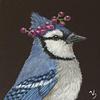Take a photo of a barcode or cover
Picked this book up after reading (and loving) Ronson's [b:The Psychopath Test: A Journey Through the Madness Industry|12391521|The Psychopath Test A Journey Through the Madness Industry|Jon Ronson|https://images.gr-assets.com/books/1364166270s/12391521.jpg|14262366]. Them is an enthralling journey to the edges of human sanity. Jon Ronson is very much a character in his own story, and the tale of how his conception of the book he's writing changes over time is just as fascinating as the stories of the men and women he studies. Ronson raises a lot of interesting food for thought about how we draw the lines between madness and sanity, between "disordered" and "normal" - and how blurry those lines can get. I adore his humanistic approach to journalism.
Lost interest after the first chapter and found it difficult to follow or pay attention to. Did not finish.
The thing I loved about being a reporter from 1995-1998 was that it gave me an excuse to ask questions. As a result, I learned things. I invited myself--or was invited by others--into places that I never would have been without a notebook in my hand: movie previews, bars, private meeings, places like that.
Jon Ronson's inquisitive mind and admirable sense of daring gets him into some pretty strange places: bouncing through the African bush with a Christian fundamentalist, creeping through the bushes to spy on a meeting in Portugal, and visiting the remains of David Koresh's Mount Carmel compound with no less a right-wing saint than Randy Weaver.
The striking thing about Ronson's book is his search for Truth. He ingratiates himself with the 'true believers,' i.e. those who see events as the work of some grand conspiracy of elite world (lizards in some cases). And he follows them, not to patronize them, but to find some truth of his own: why do people react this way?
The most eventful moments in the book are at the beginning and the end of the book. Not wanting to give too much away, one involves the outing of a Jew at a terrorist training camp, and the other involves a Sylvan ritual that may or may not confirm the fears of the New World Order.
Jon Ronson's inquisitive mind and admirable sense of daring gets him into some pretty strange places: bouncing through the African bush with a Christian fundamentalist, creeping through the bushes to spy on a meeting in Portugal, and visiting the remains of David Koresh's Mount Carmel compound with no less a right-wing saint than Randy Weaver.
The striking thing about Ronson's book is his search for Truth. He ingratiates himself with the 'true believers,' i.e. those who see events as the work of some grand conspiracy of elite world (lizards in some cases). And he follows them, not to patronize them, but to find some truth of his own: why do people react this way?
The most eventful moments in the book are at the beginning and the end of the book. Not wanting to give too much away, one involves the outing of a Jew at a terrorist training camp, and the other involves a Sylvan ritual that may or may not confirm the fears of the New World Order.
Ronson really is a very good and entertaining writer. I really enjoy his books.
Not and tight and cohesive as the other book that I've read by Ronson (So You've Been Publicly Shamed), but a fun read. His stories about the Bilderburg group and Bohemian Grove were particularly entertaining.
Ronson's first book, while entertaining in its own right, doesn't reach quite the same highs as "The Psychopath Test" or his most recent "So You've Been Publicly Shamed".
Like the others, Them is a collected of loosely collected profiles of various figures and ideas, at times bordering on travelogue. Emphasis here, though, is on loosely. While unified by the common element of extremists, as well as a belief in the secretive New World Order, the interviewees and tales here seem a tad disparate. Each is entertaining in its own right, but it doesn't build to anything satisfying. Ronson jumps from separatists to conspiracy theorists to neo-Nazis with a glib disconnect. It's like intricate puzzle pieces from 6 different puzzles that, if you squint hard enough, make a picture.
Which is not to say Them isn't worth a read. It's well-written, humorous, and gleeful, while not avoiding the larger questions. The self-reflection of humanizing extremists is a valuable exercise, and Ronson does an excellent job challenging your assumptions. But it lacks the unity of his later pieces, and as such, slightly pales in comparison.
Like the others, Them is a collected of loosely collected profiles of various figures and ideas, at times bordering on travelogue. Emphasis here, though, is on loosely. While unified by the common element of extremists, as well as a belief in the secretive New World Order, the interviewees and tales here seem a tad disparate. Each is entertaining in its own right, but it doesn't build to anything satisfying. Ronson jumps from separatists to conspiracy theorists to neo-Nazis with a glib disconnect. It's like intricate puzzle pieces from 6 different puzzles that, if you squint hard enough, make a picture.
Which is not to say Them isn't worth a read. It's well-written, humorous, and gleeful, while not avoiding the larger questions. The self-reflection of humanizing extremists is a valuable exercise, and Ronson does an excellent job challenging your assumptions. But it lacks the unity of his later pieces, and as such, slightly pales in comparison.
I like pretty much all of Jon Ronson's stuff, and this was no exception.
funny
informative
medium-paced
fairly tough to get through as written in a relatively journalistic fashion (as would be expected). Worth a read but don't expect wonders.
"Cuando yo era niño, el mundo era un peligro y uno sabía exactamente quienes eran ellos. Éramos nosotros contra ellos, y estaba claro quienes eran. Hoy ya no estamos tan seguros de quienes son, pero sabemos que están allí"
Extremistas: mis aventuras con los radicales es el segundo libro de Jon Ronson. En esta ocasión, nos ofrece un paseo junto a los personajes más estrambóticos que uno se pueda imaginar: un hombre que se autodenomina la referencia de Bin Laden en Reino Unido, el jefe de Ku Klux Klan que se niega a utilizar la palabra negrata (nigga) o un señor que da conferencias hablando de como estamos gobernados en realidad por una raza de lagartos gigantes alienígenas. Cada capítulo esta dedicado a una persona distinta y en él, Ronson nos cuenta sus experiencias con estas personas así como nos ofrece un poco de contexto o investigación sobre lo que ellas dicen.
Personalmente no tengo muy claro que todo lo que se narra en el libro sea verdad, pero en realidad no me importa. Creo que el mensaje que el libro intenta transmitir, y lo hace muy bien, es que hasta los más locos dicen algo razonable de vez en cuando y hasta los más cuerdos cometen locuras alguna vez. Y lo peor, que la verdad no es suya ni nuestra sino que se encuentra en un lugar intermedio difícil de localizar.
Mi principal problema con este libro fue que la variedad de nombre junto a la aficción de Ronson de adelantar acontecimientos o narrar otros pasados hacía difícil de seguir lo que estaba ocurriendo. Pero, en cuanto empiezas a ser familiar con los hombres, todo resulta mucho más fácil.
En resumen, Extremistas es un libro diferente que cuenta un montón de historias curiosas y que te llevara a reflexionar sobre cosas que pensaban que eran de sentido común. Una lectura entretenida y útil.
Reseña completa aquí: http://gutenbergylumiere.blogspot.com.es/2015/06/de-cuando-louis-tomlinson-me-recomendo.html
Extremistas: mis aventuras con los radicales es el segundo libro de Jon Ronson. En esta ocasión, nos ofrece un paseo junto a los personajes más estrambóticos que uno se pueda imaginar: un hombre que se autodenomina la referencia de Bin Laden en Reino Unido, el jefe de Ku Klux Klan que se niega a utilizar la palabra negrata (nigga) o un señor que da conferencias hablando de como estamos gobernados en realidad por una raza de lagartos gigantes alienígenas. Cada capítulo esta dedicado a una persona distinta y en él, Ronson nos cuenta sus experiencias con estas personas así como nos ofrece un poco de contexto o investigación sobre lo que ellas dicen.
Personalmente no tengo muy claro que todo lo que se narra en el libro sea verdad, pero en realidad no me importa. Creo que el mensaje que el libro intenta transmitir, y lo hace muy bien, es que hasta los más locos dicen algo razonable de vez en cuando y hasta los más cuerdos cometen locuras alguna vez. Y lo peor, que la verdad no es suya ni nuestra sino que se encuentra en un lugar intermedio difícil de localizar.
Mi principal problema con este libro fue que la variedad de nombre junto a la aficción de Ronson de adelantar acontecimientos o narrar otros pasados hacía difícil de seguir lo que estaba ocurriendo. Pero, en cuanto empiezas a ser familiar con los hombres, todo resulta mucho más fácil.
En resumen, Extremistas es un libro diferente que cuenta un montón de historias curiosas y que te llevara a reflexionar sobre cosas que pensaban que eran de sentido común. Una lectura entretenida y útil.
Reseña completa aquí: http://gutenbergylumiere.blogspot.com.es/2015/06/de-cuando-louis-tomlinson-me-recomendo.html




